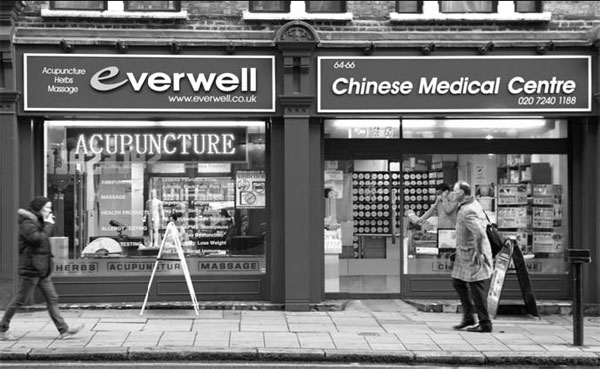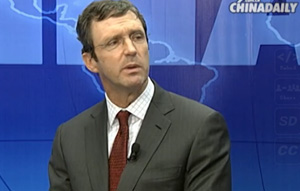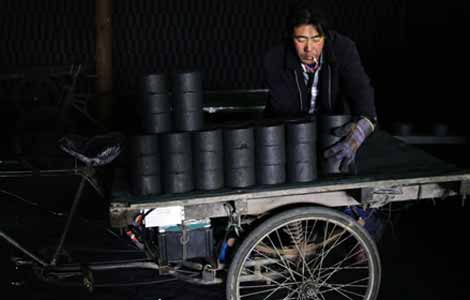Bitter pill for traditional Chinese medicine
Updated: 2013-11-25 07:49
By Zhang Chunyan (China Daily USA)
|
||||||||
New quality and safety rules may stifle sales prospects of TCM in the European market, as Zhang Chunyan reports in London.
In London's Chinatown, a poster in Chinese urges customers to stock up on traditional and other patent Chinese medicines before an impending ban on patented TCM products from next year.
At TCM clinics in London, patients still keep trickling in for acupuncture and massage services. However, there is a lull in demand for various Chinese herbal and patent medications because customers seem to be wary of the Medicines and Healthcare Products Regulatory Agency's forthcoming decision.

Therein lies the twist in the tale. Just as traditional Chinese medicine makes waves in the UK and the rest of Europe with alternative therapies such as acupuncture and massage, it finds itself being denied market access for medications.
Traditional Chinese medicine, which has evolved over 4,000 years, relies largely on patented and herbal medications to prevent and help the human body fight ailments, and treatments to relieve pain and restore balance in the body.
According to the proposal the MHRA floated on July 9, the sale of all unlicensed manufactured herbal medicinal products will be halted in the UK from next year. The MHRA is a British government agency that is responsible for ensuring that medicines and medical devices used in the UK are safe.
The proposal is not targeted specifically at TCM. Andrea Farmer, MHRA's herbal policy manager, says: "The decision was taken on the basis of the Traditional Herbal Medicinal Products Directive, incorporated by the EU in 2004, which stipulates that all the manufactured herbal medicines in the EU market should have a suitable product license."
The directive also introduced the so-called simplified registration procedure with a seven-year transition period for traditional herbal medicinal products to be licensed, including Chinese and Indian traditional medicines.
That period ended in April 2011. After that, the MHRA allowed products that were lawfully in the market before April 2011 to continue being sold, so retail businesses holding huge inventories were not unduly affected.
Although the regulator is yet to finalize its proposals and is still studying the various responses, TCM practitioners hope that a favorable decision will help rejuvenate it in Europe. But the real problem as most experts say is TCM's difficulties in getting licensed in the UK and Europe.
Changing times
A decade ago, China was becoming better known globally and demand for its products was at its peak.
"It was a golden period. TCM was enjoying a surge of popularity in the UK and there were more than 2,000 clinics," says Man Fong Mei, chairman of the Chinese Medical Council UK and president of London-based Mei's Group, which operates a series of herbal clinics and TCM shops across the UK.
Mei, in his 60s, has witnessed first-hand the ups and downs of the TCM industry in the UK.
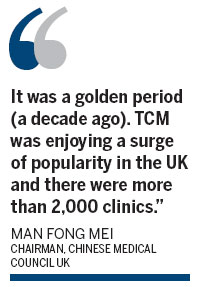
"TCM practitioners earlier faced rough weather first because there were some concerns that TCM would result in kidney and liver failure. However, those doubts were redressed after the European Union implemented the Traditional Herbal Medicinal Products Directive in 2004," he says.
Since TCM is developed through empirical testing and refinement of herbal mixtures and relies mostly on clinical experience, it is often viewed with mistrust in the West, he says.
Bo-ying Ma, president of the Federation of TCM UK, says the 2008 economic crisis nearly crippled the TCM industry. "Several TCM clinics and herbal chains had to shutter operations because of economic problems.
"Chinese medicine has also not been included in the UK's medical insurance system. As a result, British people whose incomes have fallen are reluctant to buy Chinese medicines."
The latest proposal will act as a knockout blow to the industry, Mei says. "According to my estimates, there are only 1,000 TCM clinics in the UK now. Most of them may find the going even more tough, especially as they try to cope up with the new standards, registration norms and so on."
Typically a TCM business consists of three parts, acupuncture and associated treatments, herbal medicines and industrially manufactured herbal products. If the MHRA proposal is implemented from next year, it will not affect the sales of loose or individual herbs and other self-made products. But TCM practitioners will be in a fix, Mei says, because they can no longer prescribe time-trusted Chinese medications.
"More than 40 percent of our patients take TCM capsules. If this regulation is implemented, then that section will lose access to their medication.
"A lot of the patients are frequent travelers and find it convenient to carry the medicines with them."
Mei says that although several TCM companies had attempted to complete the registration process, they failed to do so because they did not have the documents and money needed.
"TCM companies want to be licensed in Europe and the UK. But things are not that easy."
A big area of concern for most TCM companies is the mandatory stability studies for end products. Mei says that while these studies are possible for single ingredients or herbs, it is not easy for multi-herbal products.
"TCM companies also need to conduct toxicology tests to get a license. All the necessary tests and arrangements will cost upwards of 1 million pounds ($1.6 million) - and that too for just one TCM product."
Mei, who is also a participant in the MHRA consultations as a stakeholder, says that "although some companies have the money and means to get the stipulated tests done, it is often difficult to satisfy Western authorities on the stability and toxicology test results".
The EU directive was originally drafted in 2004 by MHRA and then proposed to the European Parliament, he says.
Regulatory concerns
The directive stipulates that applicants must provide documents showing the product is not harmful in the specified way it is used, as well as evidence that the product has a 30-year safety record, including 15 years in the EU.
Although it dates back millennia, TCM did not enter the EU market until the mid-1990s. Even then, TCM drugs were largely sold to EU customers as food supplements, rather than as drugs.
Chinese drug makers and importers did not preserve the customs papers from a decade ago, and are thus unable to prove the 15-year use record in European markets.
Robert Verkerk, founder of Alliance for Natural Health, an international campaign working in the natural health field, says: "In 2008, the European Commission provided a report on traditional herbal products. In its last paragraph, it indicated that the EU directive was not suitable for traditional medicine systems such as TCM."
The regulation had indicated that it would consider a new framework for traditional products if there was sufficient demand, Verkerk says.
"We have been doing a lot of work with the European Parliament. We created a strong core group of 40 to 50 parliamentarians to canvass support for our cause. However, it is frustrating to note that a change of guard at the top has pushed the whole issue onto the backburner."
However, the predicament of TCM professionals appears in stark contrast to the various government initiatives that encourage and urge them to get registered in Europe.
Various government and public research institutes have frequently encouraged TCM companies and clinics to register by creating expert teams, holding national meetings and publishing EU registration handbooks, according to sources from the China Chamber of Commerce for Import & Export of Medicines and Health Products.
Although the April 30, 2011, deadline has long passed, there were no efforts on the part of the TCM industry to step up the registration process, they say. However, industry sources maintain that the relatively small sales volumes in European markets were a big disincentive for companies to spend huge amounts on product registration.
In 2010, China's TCM exports to the EU were valued at 152 million pounds, accounting for 13 percent of total TCM exports. However, Ma says, the average cost for certifying and registering a TCM consisting of six herbs is about 300,000 pounds.
Ma says he has on several occasions urged TCM practitioners in the UK to jointly petition the MHRA to drop the plan. Mei says: "Personally, I think the MHRA should give us an extension of two more years so that we can sell our stocks."
Part of the problem is that Europe is one of the toughest drug markets to break into because of the stringent rules and regulations on safety.
The TCM industry and practitioners need to understand what is actually happening in both the European and UK laws that affect them, Verkerk says, adding that they also need to be proactive in trying to protect their future.
Although industrially manufactured herbal products are facing problems, TCM clinics are banking on acupuncture, massage and other treatment procedures to further expand in Europe.
Nick Pahl, chief executive officer of the British Acupuncture Council, the leading self-regulatory body for the practice of traditional acupuncture in the UK, says it has been estimated that the demand for acupuncture treatment has almost doubled in the past decade to more than 4.5 million treatments every year. "This indicates that acupuncture is one of the most popular forms of treatment in the UK.
"British patients believe that acupuncture is effective and has no side-effects," Pahl says, adding that acupuncture also falls under the British National Health Service.
"The increasing research evidence base for acupuncture and the recommendations from the National Institute for Clinical Excellence, especially for lower back pain, headache and migraine have also spurred demand," Pahl says.
"There have been several studies that have proved the effectiveness of acupuncture treatment of chronic ailments such as depressions and osteoarthritis."
Dominique Joire, the service manager and senior practitioner at the Gateway Clinic in London, says his clinic accepts TCM referrals from general practitioners and provides acupuncture for more than 300 patients a week, mainly for long-term conditions.
Body acupuncture at Gateway Clinic is used to treat problems such as musculo-skeletal pain, headaches, migraine and cancer symptoms.
Gateway Clinic is 100 percent funded by the NHS, Dominique says. Usually the GPs send the patients to a physiotherapist and only when the physiotherapist cannot solve the problem will they be sent for acupuncture. "On average the waiting period for acupuncture treatment is about three months," Joire says.
Currently in the UK, there are various forms of acupuncture service. Some are carried out within the NHS, such as Gateway Clinic, which means the patients are referred by their GPs and do not have to pay, says Elizabeth Wilmot, who qualified as an acupuncturist about five years ago, after working as a consultant psychiatrist for 20 years with the NHS.
The downside of this option is that the line is long and the service is limited, Wilmot says, adding that it prompts several patients to go to private clinics with a charge, such as the Nottingham University Hospitals Self-Pay Pain Clinic.
Almendra Mcbride, a British patient who started taking acupuncture and Chinese medicines on the advice of a friend about 30 years ago, says both are effective, although the capsules take longer to produce the desired results.
Apart from acupuncture, massage and cupping are also becoming more popular, Pahl says.
Acupuncture research and studies are other areas that are gaining ground in Europe. There is already huge demand for courses that are certified by the British Acupuncture Accreditation Board. There are also universities and colleges that offer degree level courses in London and four other towns.
After students complete a BAAB accredited course they can opt to join the British Acupuncture Council, which has more than 550 students on its rolls.
Pahl expects the number of students to increase with the recent launch of two new teaching institutions, at City College in London and the Acupuncture Academy in Leamington.
Wang Mengzhen and Wang Mingjie contributed to the story.
|
A traditional Chinese medicine clinic in Chinatown, central London. He Chao / For China Daily |
(China Daily USA 11/25/2013 page13)

 Cutting output to help ease pollution
Cutting output to help ease pollution
 Sochi Olympic flame plunges into largest freshwater lake
Sochi Olympic flame plunges into largest freshwater lake
 Mount Etna erupts, lighting up Sicilian sky
Mount Etna erupts, lighting up Sicilian sky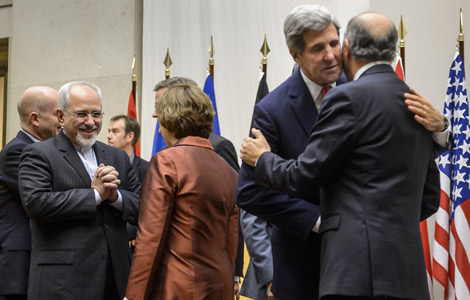
 Deal reached in Iranian nuclear talks
Deal reached in Iranian nuclear talks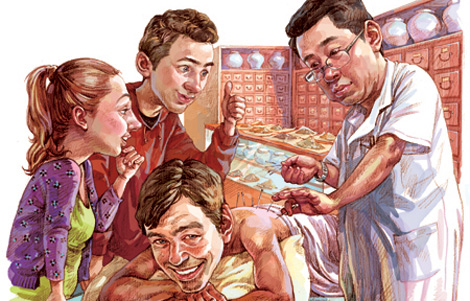
 Bitter pill for traditional Chinese medicine
Bitter pill for traditional Chinese medicine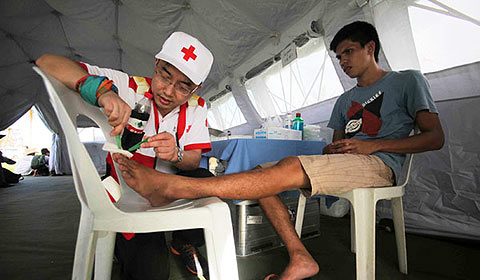
 Rescuers work in Tacloban
Rescuers work in Tacloban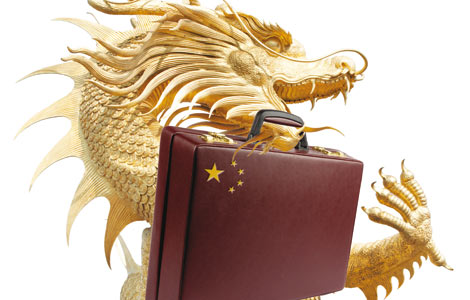
 Roar of the East being heard
Roar of the East being heard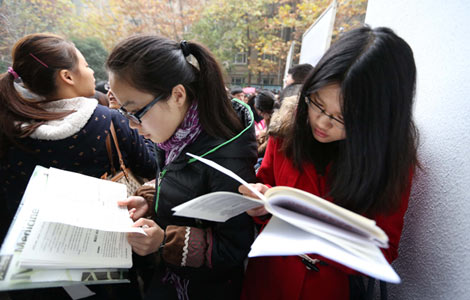
 1.12m seek government jobs
1.12m seek government jobs
Most Viewed
Editor's Picks

|

|

|

|

|

|
Today's Top News
Vice-Premier ends US trip in NYC
China to target price fixing: report
Shenyang to offer 72-hour visa-free stays
Japanese PM concerned over China's air defense zone
Creating the next Asian global name
Deal reached in Iranian nuclear talks
Getting to know Tianjin
Pactera regains some momentum
US Weekly

|

|
